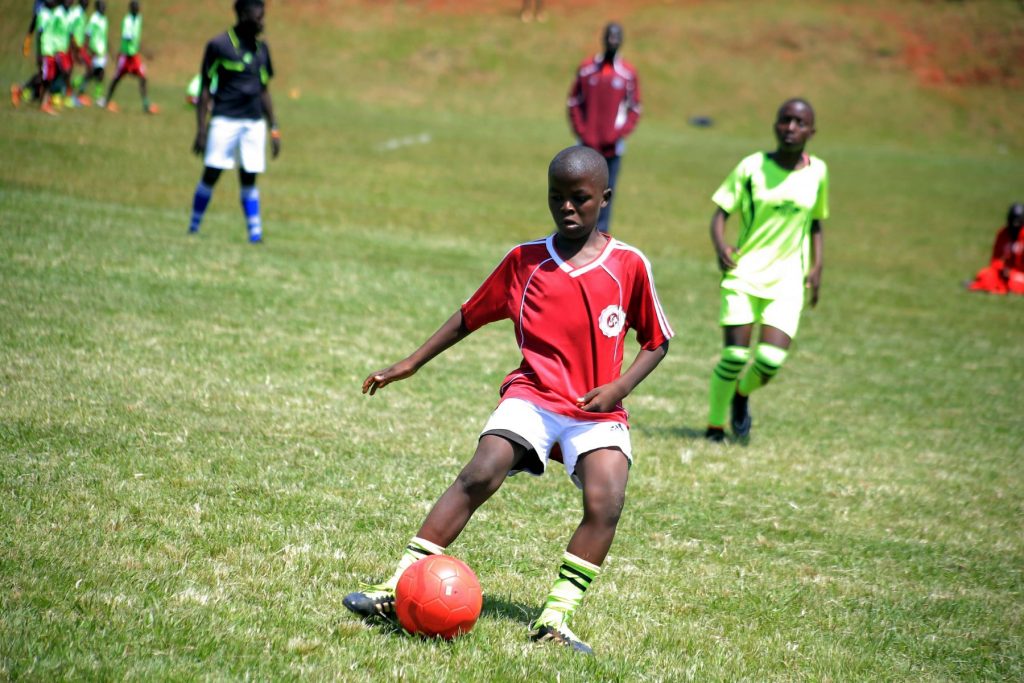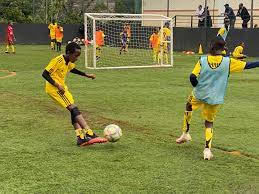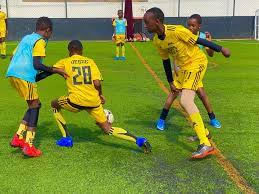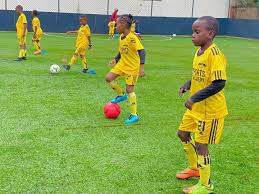Coaching Department - Talent Development Phases
Pre-Academy Phase
- For children 5-6 years old
- 5v5 Pitch Configuration
- Two Assigned Coaches
Foundation Development Phase
- For children 7-12 years old
- 7v7 and 9v9 Pitch Configuration
- Two Assigned Coaches
Youth Development Phase
- For children 13-17 years old
- 11v11 Pitch Configuration
- Two Assigned Coaches
Professional Phase (Competition phase)
- For children of 18+ years
- 11v11 Pitch Configuration
- Two Assigned Coaches






Our comprehensive training program for a youth soccer academy involves a combination of technical, tactical, physical, and mental development. The specific programs are based on the age group and skill level of the players, but here are some general training components you can include:
Fundamental Skills Development:
- Dribbling: Focus on ball control, close ball handling, and changing direction.
- Passing: Teach proper passing techniques, short and long-range passing, and accuracy.
- Shooting: Work on shooting accuracy, power, and different types of shots (e.g., volleys, headers).
- Ball Control: Improve first touch, trapping, and juggling skills.
Tactical Understanding:
- Positional Play: Teach players their roles and responsibilities within different formations.
- Teamwork: Emphasize communication, teamwork, and understanding of the game’s principles.
- Game Scenarios: Practice various in-game situations (e.g., counter-attacks, set pieces).
- Decision-Making: Develop players’ ability to make quick, effective decisions on the field.
Physical Conditioning:
- Speed and Agility: Work on sprinting, acceleration, and lateral movement.
- Strength and Endurance: Build physical strength and cardiovascular fitness.
- Flexibility: Include stretching and mobility exercises to prevent injuries.
- Injury Prevention: Educate players on proper warm-up routines and injury prevention techniques.
Goalkeeper Training:
- Specific goalkeeper drills for handling, diving, positioning, and distribution.
- Decision-making under pressure and communication with defenders.
Small-Sided Games:
- Use small-sided games (3v3, 4v4, 5v5) to develop skills and improve decision-making.
- Smaller spaces encourage more touches on the ball.
Match Simulation:
- Full-field scrimmages to apply learned skills in a realistic game setting.
- Analyze matches to identify areas for improvement.
Psychological and Mental Development:
- Confidence Building: Develop players’ self-confidence and belief in their abilities.
- Focus and Concentration: Teach players to stay focused during matches.
- Handling Pressure: Prepare players to cope with the pressure of competition.
Nutrition and Recovery:
- Educate players about proper nutrition, hydration, and recovery strategies.
- Emphasize the importance of rest and sleep for performance.
Video Analysis:
- Review game footage to assess individual and team performance.
- Identify areas for improvement and reinforce tactical concepts.
Goal Setting and Planning:
- Help players set individual and team goals for the season.
- Develop a plan to track progress and achieve these goals.
Leadership and Sportsmanship:
- Promote leadership skills, teamwork, and good sportsmanship among players.
- Encourage respect for coaches, teammates, opponents, and referees.
Parent Education:
- Involve parents in the development process and educate them about the academy’s philosophy and expectations.
We tailor your training program to the specific age group and skill level of your players. Additionally, we ensure that the program is progressive, with drills and exercises that gradually increase in complexity as players develop their skills and understanding of the game. Regular assessments and feedback sessions can also be beneficial to track progress and make necessary adjustments.
